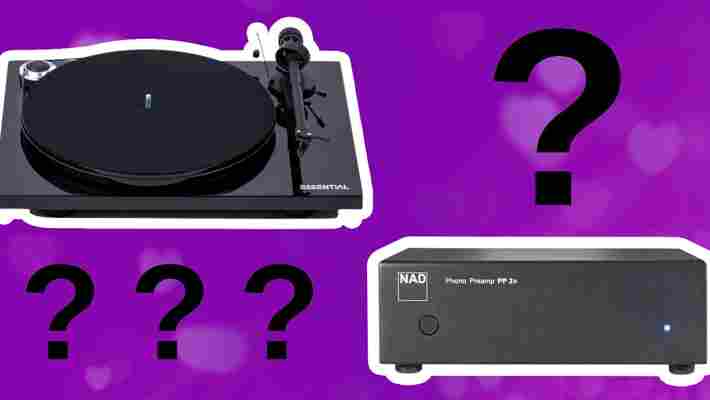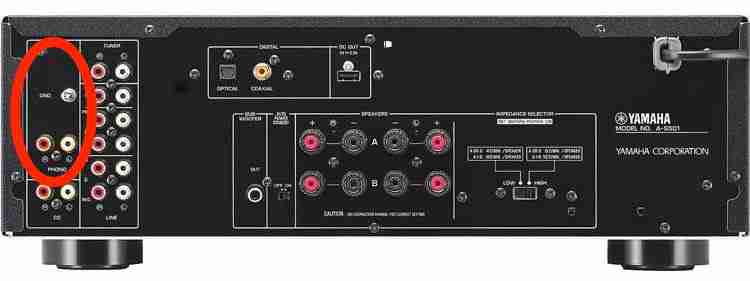I’m gonna save you some time: yeah, you probably should buy an external phono preamp for your record player. Easy, right?

Not enough info? Want to dig a little deeper? Don’t worry — I’ve got you covered.
In this piece we’re going to explore what a phono preamp is, and why you, an audio fan, should add an external one to your setup. First things first…
What’s a phono preamp?
Let’s get simple. A phono preamp (or phono stage) amplifies the sound of your record player so it can be played through your sound system.
The signal that a turntable produces is too weak to be compatible with standard amplifiers. This is why you need a phono preamp to boost the record player’s output before connecting it to whatever’s driving your speakers.
It also provides equalization to the turntable, but that’s a topic for another day.
Do you need a phono stage to play vinyl?
Yep. Some record players have these built in, but this is less common in quality hardware. That’s not to say you can’t get great turntables with in-built phono preamps — the existence of the Pro-Ject Juke Box E and the Rega Planar 1 Plus proves this — they’re just less typical.
What’s more common is that some amplifiers will have a phono preamp built in. Normally, they look something like this:


And are phono preamps on stereo amplifiers good?
That, of course, depends. If you buy an expensive stereo amplifier that has an in-built phono preamp, it’s probably going to be pretty good. But if it’s a cheaper amplifier? Then it’s likely some concessions have been made.
I’d like to make something clear though: there’s absolutely nothing wrong with playing records with an in-built phono stage.
In fact, until recently, I’ve only ever played records at home using stereos with an in-built phono preamp. Having an amplifier that has a range of different inputs is an absolute godsend when you’re building an audio system on a budget.
But now I’ve started using an external phono preamp, I’m not sure I can ever go back.
What is an external phono preamp?
It’s pretty simple. Rather than having a phono stage that’s built into a turntable or amplifier, you can get a standalone unit. You can then plug this into a regular audio input on an amplifier, stereo, or speaker.
And how’s it different from an in-built one?
Think of it this way. If you buy a $500 amplifier, there are a huge number of components and functions included in that price. This can lead to some lower quality — or non-ideally optimized — elements being included in order to keep the cost down and do as much as possible.
On the other hand, an external phono stage has a single purpose. It’s designed to be the bridge between your turntable and stereo. This means that basically all the cash you’re spending is going to doing that specific thing really well.
Does an external phono stage make a difference?
To my ears, hell yeah.
I’ll be honest: I didn’t expect to hear that much of a difference. Recently, I upgraded the stylus on my record player to something more premium. While the sound quality definitely improved, I was disappointed.
After the change, I expected a technicolor burst from my music. Instead, things sounded a bit… flat. Clearer, certainly, but not the leap I was expecting — or had experienced elsewhere.
Did the external phono preamp improve the sound quality?
Immediately. When I plugged the NAD PP 2e external phono preamp into my amplifier, the difference was stark.
The sound was richer and rounder, the disappointing flatness of my new stylus had dissipated. In its place, the music sounded vibrant and textured. God, I’m getting all teary eyed just thinking about it.
Would you recommend the NAD PP 2e?
Definitely. It’s an absolute breeze to use. You plug your record player into the NAD PP 2e phono preamp and then connect that to a normal line in on your amplifier. Press a button on the device and, boom, gorgeous sound.
It’s also a bit of a bargain. At around $180, it costs less than my new stylus did. I mean, it’s not cheap. But if you’re into records, you’re probably spending close to that each month on new additions to the collection anyway. Something like the NAD PP 2e will make that experience all the sweeter.
What are the other benefits to an external phono stage like the NAD PP 2e?
Beyond simply the sound improvements, there are some structural benefits to an external phono preamp. Mainly that having one allows you more flexibility over the years.
You have a wider choice of amplifiers you can work with. You can use it to hook into other systems (like Bluesound’s NODE for example) to stream your vinyl across multiple speakers. You also have the option of experimenting with different cartridges, whether they’re moving magnet or moving coil.
On top of that, when you buy a more budget-style phono preamp, it gives you the ability to upgrade later and improve your sound system bit by bit.
What should I look for when buying my first external phono preamp?
Read and research. Go into a store and try some out. Experiment. The NAD PP 2e is a great choice, but there are a raft of amazing companies producing terrific entry-level phono stages. Rega, iFi, or Pro-Ject all make wonderful hardware.
But everything sounds different depending on what equipment you have and, most importantly, your ears and taste. This is a journey you need to take yourself. And you know what? I’m excited for you.
That’s enough from me today — I’ve got a lot of records that need listening to. I’ll catch you chumps later.

